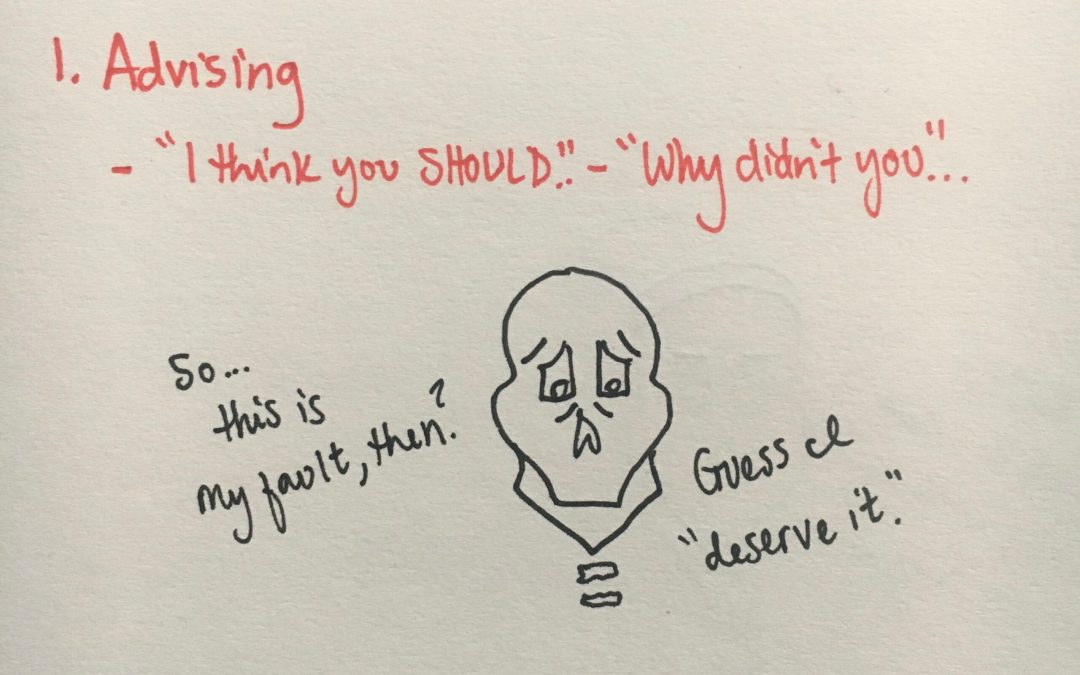Can't even keep up with posting these abusive work articles recently! Like this one and this one. Further evidence...


Can't even keep up with posting these abusive work articles recently! Like this one and this one. Further evidence...

Trauma leaves us without a stable sense of self... and if that's the CPTSD symptom you've struggled to comprehend the...

Just a quick "lol but not" on this one! The story below made me think of this recent post from TMFRs. “How to deal...

If there's one thing I regret in the making of TMFRs and my own recovery effort... It's the self-scrutinizing approach...

Stumbled upon this Forbes article about dealing with covertly manipulative / abusive coworkers. "How To Deal With Mind...

Warning: general discussion of the world being a dumpsterfire and that burning nightmare being caused by unexamined...

What a time to be sortof alive ... as I lay in bed, clutching my guts, chronically moving because low blood pressure...

https://www.upworthy.com/dishonest-harmony-boomer-parent Stumbled upon an article this morning that provided two...

This podcast episode explores the disorganized personality structuring of narcissists, explaining how their lack of integration affects their behavior and relationships. It discusses different levels of personality organization and how narcissists’ fragmented psyches lead to inconsistent and often manipulative actions. The episode draws parallels between narcissistic behaviors and childlike reactions, offering insights into why narcissists may seem unpredictable or intentionally deceptive. It also touches on the importance of self-integration in developing personal integrity and maintaining healthy relationships.

This podcast episode explores the concept of “adaptive narcissism” and its potential benefits for trauma recovery and psychological resilience. It challenges common perceptions of narcissism, discussing how certain traits associated with grandiose narcissism, such as self-sufficiency and vanity, can be protective against PTSD symptoms. The episode emphasizes the importance of developing a healthy sense of uniqueness and authenticity while avoiding harmful aspects of narcissism like entitlement and exploitativeness.

This podcast episode explores the complex topic of filial obligation, discussing various philosophical perspectives on children’s duties towards their parents. It examines the relationship between ambivalence, guilt, and caregiver burden in parent-child dynamics. The episode also considers cultural differences in approaching filial piety, including Confucian views on self-realization through familial duty. It addresses the factors that influence the perception and outcomes of filial caregiving, offering listeners insights to navigate these challenging family decisions.

This podcast episode explores the concept of vulnerable narcissism and its relationship to trauma recovery. It discusses how recovery resources like time, space, and energy can be misused, potentially leading to the development of narcissistic traits. The episode examines the characteristics of vulnerable narcissists, including their tendency towards negative time orientation and manipulative behaviors, and how these traits may stem from unresolved trauma.

This podcast episode explores various forms of transference in relationships and mental health, including projection, monkey-barring, and displacement. It discusses how these cognitive patterns can affect interpersonal dynamics and therapy outcomes. The episode emphasizes the importance of self-reflection and critical thinking in recognizing and addressing these patterns for improved emotional intelligence and relationship health.

This podcast episode explores ten destructive responses to avoid in sensitive conversations, based on NonViolent Communication principles. It discusses why people use these responses and their impact on relationships. The episode provides insights into improving communication skills, especially during stressful holiday interactions with family. It emphasizes the importance of empathy, active listening, and self-awareness in fostering healthier interpersonal dynamics.

This podcast episode explores the concept of chronic self-deprivation and its roots in childhood neglect. It discusses how unrecognized personal needs can lead to self-sabotage, psychosomatic illness, and codependency. The episode offers insights into breaking these patterns by identifying and fulfilling a comprehensive range of human needs, emphasizing the importance of self-care in trauma recovery and personal growth.

This podcast episode explores how NonViolent Communication (NVC) can be used as a tool for trauma recovery and personal growth. It discusses challenging toxic beliefs, identifying unmet needs, and the impact of self-neglect on mental health. The episode emphasizes the importance of self-awareness and fulfilling personal needs as key components in breaking cycles of trauma and depression.